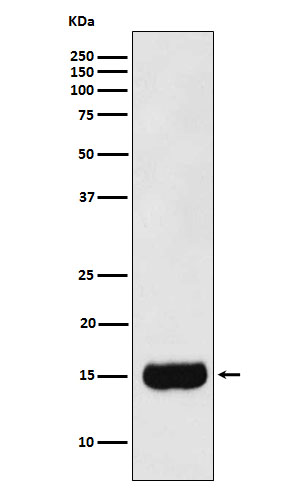
| WB | 1/500-1/1000 | Human,Mouse,Rat |
| IF | 1/20 | Human,Mouse,Rat |
| IHC | 1/50-1/100 | Human,Mouse,Rat |
| ICC | 技术咨询 | Human,Mouse,Rat |
| FCM | 咨询技术 | Human,Mouse,Rat |
| Elisa | 咨询技术 | Human,Mouse,Rat |
| Aliases | MSP; PSP; IGBF; MSPB; PN44; PRPS; HPC13; PSP57; PSP94; PSP-94 |
| Entrez GeneID | 4477 |
| WB Predicted band size | Calculated MW: 13 kDa; Observed MW: 13 kDa |
| Host/Isotype | Rabbit IgG |
| Antibody Type | Primary antibody |
| Storage | Store at 4°C short term. Aliquot and store at -20°C long term. Avoid freeze/thaw cycles. |
| Species Reactivity | Human |
| Immunogen | A synthesized peptide derived from human Prostate Secretory Protein/PSP |
| Formulation | Purified antibody in PBS with 0.05% sodium azide. |
+ +
以下是关于前列腺分泌蛋白(PSP94.亦称β-微精蛋白/MSMB)抗体的3篇参考文献,内容基于公开研究整理:
---
1. **文献名称**: *Monoclonal antibodies to human prostate secretory protein (PSP94) regulate prostate cancer cell growth in vitro*
**作者**: Gabril MY, et al.
**摘要**: 该研究开发了针对PSP94的单克隆抗体,并发现其能够通过调节细胞周期蛋白(如Cyclin D1)抑制前列腺癌细胞(LNCaP)的体外增殖,提示其在癌症治疗中的潜在应用。
2. **文献名称**: *Prostate secretory protein (PSP94) as a diagnostic marker for prostate cancer: antibody production and clinical validation*
**作者**: Chan LW, et al.
**摘要**: 研究通过免疫组化证实PSP94抗体在前列腺癌组织中高表达,尤其在雄激素非依赖性肿瘤中,提出PSP94可作为血清生物标志物辅助诊断及预后评估。
3. **文献名称**: *Structural characterization of PSP94 and its antibody interaction: implications for biomarker discovery*
**作者**: Udumudi A, et al.
**摘要**: 通过X射线晶体学解析PSP94蛋白结构,并分析其与抗体的结合表位,为开发高特异性检测试剂(如ELISA)提供了分子基础,助力前列腺癌早期筛查。
---
**备注**:若需获取全文或更早期经典文献(如关于PSP94基因调控的研究),建议通过PubMed或Sci-Hub输入关键词“PSP94 antibody”或“MSMB antibody”进一步检索。
Prostate secretory protein (PSP), also known as β-microseminoprotein (β-MSP) or PSP94. is a small, cysteine-rich protein primarily secreted by prostate epithelial cells. Encoded by the *MSMB* gene, PSP is a major component of seminal plasma and is implicated in innate immune regulation, sperm motility, and mucosal protection in the reproductive tract. Its expression is androgen-regulated and often downregulated in prostate cancer, making it a potential biomarker for disease progression.
Antibodies targeting PSP are valuable tools in research and diagnostics. Polyclonal and monoclonal anti-PSP antibodies have been developed to detect PSP in biological samples via techniques like ELISA, immunohistochemistry, and Western blot. These antibodies help elucidate PSP's physiological roles, including its interactions with immunomodulatory proteins (e.g., IgG Fc binding) and its proposed tumor-suppressive effects. Clinically, PSP antibody-based assays are explored for monitoring prostate cancer recurrence or assessing benign prostatic hyperplasia. Recent studies also investigate PSP's utility in targeted therapies, such as antibody-drug conjugates. However, challenges remain in standardizing PSP quantification due to protein heterogeneity and low circulating levels in serum. Ongoing research aims to refine antibody specificity and optimize their application in both mechanistic studies and translational medicine.
×